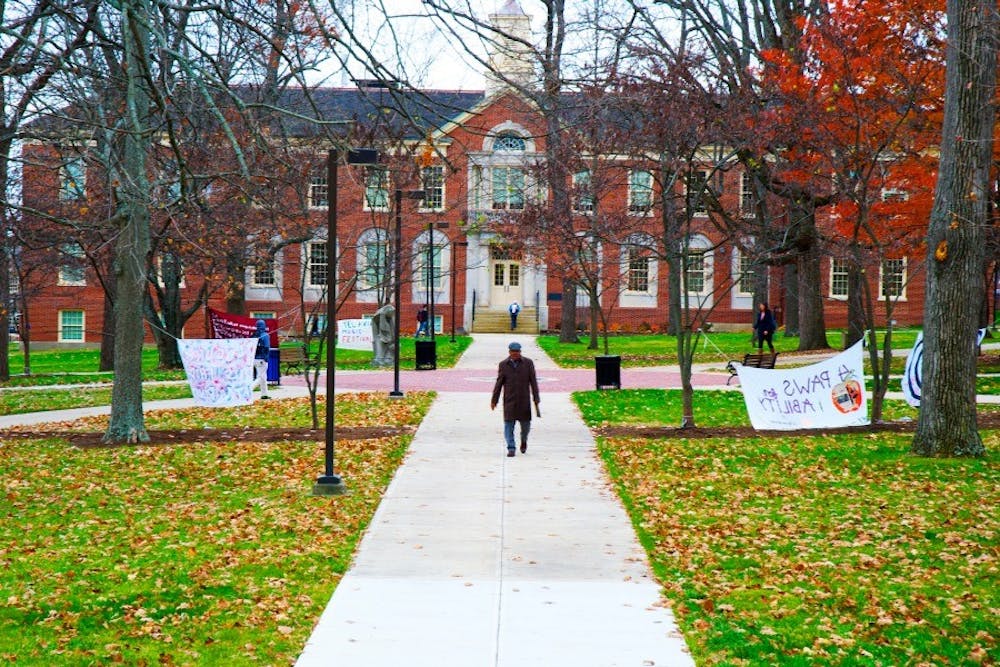By Rebecca Huff, Staff Writer
Miami University turns to task forces to address many issues that arise on campus, such as sexual assault, alcohol and drug abuse, the impact of a changing economy and regional differentiation.
"A task force is simply an ad hoc committee set up by an administrator to address a specific issue on an as-needed basis," said Jim Oris, chair of the Regional Campus Process Committee. "The term 'task force' is just a name."
Many factors are involved when deciding to assemble a task force. First is the issue itself: if it's been dealt with before, how big the issue is, its sense of urgency and choosing its members.
A task force is created to be diverse in members. It can consist of cabinet members, administrators, professors and students.
"When choosing a student, we ask, 'Is this someone who will benefit from being on the task force?'" said President David Hodge. "We are trying to develop the next generation of leaders."
The inclusion of student-positions on a task force allows for the unique understanding and insight of undergraduates at Miami. The student members are to act as a voice for the student body.
"We want to make sure that the students that serve on the task force represent large populations of students," said Rebecca Baudry Young, director of Student Wellness and member of the Sexual Assault Prevention Task Force. "Most of the students are referred to by faculty or administrators, but typically it's the students who are expressing some passion for these issues."
The administrators implement policies they think will make the campus better and safer for its students, but these policies aren't always simple solutions.
"The task force isn't there to discover something new," Hodge said. "It's rare for the task force to say, 'Oh we found the silver bullet.'"
One of Miami's many task forces, the Sexual Assault Prevention Task Force, was issued in 2006 and, when revisited in 2013, three of the 19 initial recommendations had not been achieved.
"Institute a process for regularly assessing sexual assault programs, policies and services for outcomes and impact. Not achieved."
Enjoy what you're reading?
Signup for our newsletter
"Implement a mandatory sexual assault prevention program (e.g., 'Sex Signals') for first year students. Piloted but not sustained."
"Incorporate a program on sexual assault into First-Year Institute. Still to be done."
"We didn't at the time have a fulltime Sexual Assault Coordinator to be accountable and prioritize those types of recommendations," Baudry Young said. "Those things are now being achieved through that position and other efforts on campus."
That position has now been filled by Becca Getson, who is also Miami's Deputy Title IX Coordinator for Student Sexual Assault.
There are always questions and concerns that arise when a task force addresses an issue, according to Hodge.
"A task force is created to make that issue more coherent and comprehensive to the community," Hodge said.
The task forces research solutions and look at models from other schools in order to alleviate any confusion the public might have regarding the issue being addressed. By looking at data and what other schools were doing, the Sexual Assault Task Force was able to make these five recommendations:
"Implement a campus-wide campaign to enhance a culture of safety, respect and inclusion."
"Expand campus-wide educational programs on sexual assault prevention and risk-reduction."
"Enhance current supports for victims and adjudication of perpetrators; systematically assess the effectiveness of these services."
"Identify sustained funding, including a permanent budget, for the implementation and ongoing maintenance of the Campaign on Respect and Inclusion, the expanded campus education programs, and the comprehensive website."
"Coordinate these efforts across all campuses."
"Our task force was created to look at all efforts needed across campus that would help create an approach for victim survivors as well as educating our students, in general, about sexual assault, consent, harassment and other issues with interpersonal violence," Baudry Young said.
But, the question remains: for how long and on what scale must an issue be unresolved in order to warrant the creation of a task force?
"That's not an easy question to answer," Hodge said. "It's all about the timing, place, urgency and size of the issue. The Strategic Priorities Task Force had a sense of urgency, the Regional Campus Task Force had a sense of urgency."
In 2008, the Ohio Governor and Board of Regents mandated that regional campuses such as Miami University in Hamilton and Middletown offer four-year degrees to better allow for the community colleges in Ohio to offer two-year degrees.
"The current trajectory of the regional campuses is not financially sustainable nor is it programmatically sufficient to meet the needs of the students and the region," Hodge stated in his letter to the Regional Campus Task Force.
The Strategic Priorities Task Force was created during the changing economy of 2010. According to its final report released Dec. 15, 2010, its goal was "to recommend a framework that will guide and inspire our decisions over the next five years and beyond in order to advance Miami as a premier national university."
"Each one was successful in meeting the spirit and intent of their specific charges," Oris said.
The university relies on task forces to problem solve and provide ways of improvement.
"The success of these task forces relies on the cool heads at the table," said Shar Qureshi, regional student member of the Regional Campus Task Force.




